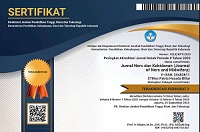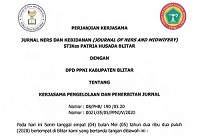The Correlation between the History of Antenatal Care Visits during The Covid -19 Pandemic and Stunting Incidents
DOI:
https://doi.org/10.26699/jnk.v10i1.ART.p040-045Keywords:
antenatal care, covid-19 pandemic, stuntingAbstract
Stunting occurs due to chronic malnutrition that has been going on for a long time, namely from the time the child is in the womb until the child is 2 years old. Limited access to antenatal care is one of the causes of stunting. The COVID-19 pandemic has had an impact on health services, including maternal and child health services. The purpose of this study was to analyze the correlation between the history of antenatal care visits during the COVID-19 pandemic and the incidence of stunting. This was a quantitative study using an observational case-control research design with a retrospective approach. The population was all mothers who had babies aged 0–12 months in Kebonagung Village area, Pakisaji District, Malang Regency. The sampling technique used total sampling. The sample was 70 respondents. The data obtained were analyzed using the Chi-squared correlation test with a p value of 0.05. The results showed that there was a significant correlation between antenatal care visits during the COVID-19 pandemic and the incidence of stunting in the Kebonagung Village area, Pakisaji District, Malang Regency, with a p value of = 0.000 (p < 0.05). with moderate closeness and a correlation coefficient value of (r) = 0.2352. It is expected that health workers will provide counseling, information, and education to pregnant women about the importance of prenatal checks to prevent stunting
References
Amini, A. (2016). Hubungan Kunjungan Antenatal Care dengan Kejadian Stunting Pada Balita Usia 12-59 Bulan Di Kabupaten Lombok Utara Provinsi NTB. Diakses pada http://digilib.unisayogya.ac.id/2381/1/Naskah%20Publikasi.pdf
Ernawati, N. (2019). Kejadian Balita Stunting di Posyandu Apel Desa Jambearjo Kecamatan Tajinan Kabupaten Malang. Jurnal Kesehatan Mesencephalon, 5(2), 59-64
Fitrianingtyas, I., Pertiwi, F.D., Rachmania, W. (2018). Faktor-Faktor Yang Berhubungan Dengan Kejadian Kurang Energi Kronis (Kek) Pada Ibu Hamil Di Puskesmas Warung Jambu Kota Bogor. Hearty Jurnal Kesehatan Masyarakat, 6 (2)
Heryanto, M. L. (2021). Kunjungan Antenatal Care dengan Kejadian Stunting pada Anak Usia 24-36 Bulan. Jurnal Ilmiah Pannmed, 16(1), 1-8
Hutasoit, M., Utami, K.D., Afriyliani, N.F. (2020). Kunjungan Antenatal Care Berhubungan Dengan Kejadian Stunting. Jurnal Kesehatan Samodra Ilmu, 11(1). https://doi.org/10.55426/jksi.v11i1.13
Kemenkes RI. (2021). Buku Saku Hasil Survei Status Gizi Indonesia (SSGI) Tingkat Nasional, Provinsi, dan Kabupaten/Kota Tahun 2021. Jakarta: Kementerian Kesehatan Republik Indonesia
Kemenkes, RI. (2018). Laporan Nasional Riskesdas 2018. Jakarta: Badan Penelitian dan Pengembangan Kesehatan.
Noor, M.S., Andrestian, M.D., Dina, R.A., Ferdina, A.R., Dewi, Z., Hariati, N.W., Rachman, P.H., Setiawan, M.I., Yuana, T.W., Khomsan, A. (2018). Analysis of Socioeconomic, Utilization of Maternal Health Services, and Toddler’s Characteristics as Stunting Risk Factors. Matern Child Nutr. 14(4). doi: 10.1111/mcn.12617
Qoyyimah, A.U., Wintoro, P.D., Hartati, L., Chasanah, M. (2021). Hubungan Riwayat Ibu Hamil Kekurangan Energi Kronis Dengan Kejadian Stunting Pada Balita Usia 3-5 Tahun Di Puskesmas Jatinom Klaten. Prosiding Seminar Nasional UNIMUS, Volume 4, 2021
Rachmi, C. N., Agho, K. E., Li, M., & Baur, L. A. (2016). Stunting, underweight and overweight in children aged 2.0–4.9 years in Indonesia: Prevalence trends and associated risk factors. PLoS ONE, 11(5), e0154756 10.1371/journal.pone.0154756.
Saleh, A., Syahrul, S., Hadju, V., Adriani, I., dan Restika, I. (2021). Role Of Maternal in Preventing Stunting: A Systematic Review. Gac. Sanit. 2021;35:S576–S582. doi: 10.1016/j.gaceta. 2021.10.087.
Torlesse, H., Cronin, A.A., Sebayang, S.K., Nandy, R. (2016). Determinants of stunting in Indonesian children: Evidence from a cross-sectional survey indicate a prominent role for the water, sanitation and hygiene sector in stunting reduction. BMC Public Health. 2016;16:1–11. doi: 10.1186/s12889-016-3339-8.
Vaivada, T., Akseer, N., Akseer, S., Somaskandan, A., Stefopulos, M and Bhutta, ZA, (2020). Stunting in childhood: an overview of global burden, trends, determinants, and drivers of decline. Am J Clin Nutr. 2020 Sep; 112(Suppl 2): 777S–791S. doi: 10.1093/ajcn/nqaa159.
Wiraswati, Atun. (2022). Pelayanan Antenatal Care (ANC) Pada Masa Pandemi Covid-19. Kemenkes Dirjen Yankes.
Downloads
Additional Files
Published
How to Cite
Issue
Section
License
Copyright (c) 2023 Jurnal Ners dan Kebidanan (Journal of Ners and Midwifery)

This work is licensed under a Creative Commons Attribution-ShareAlike 4.0 International License.







